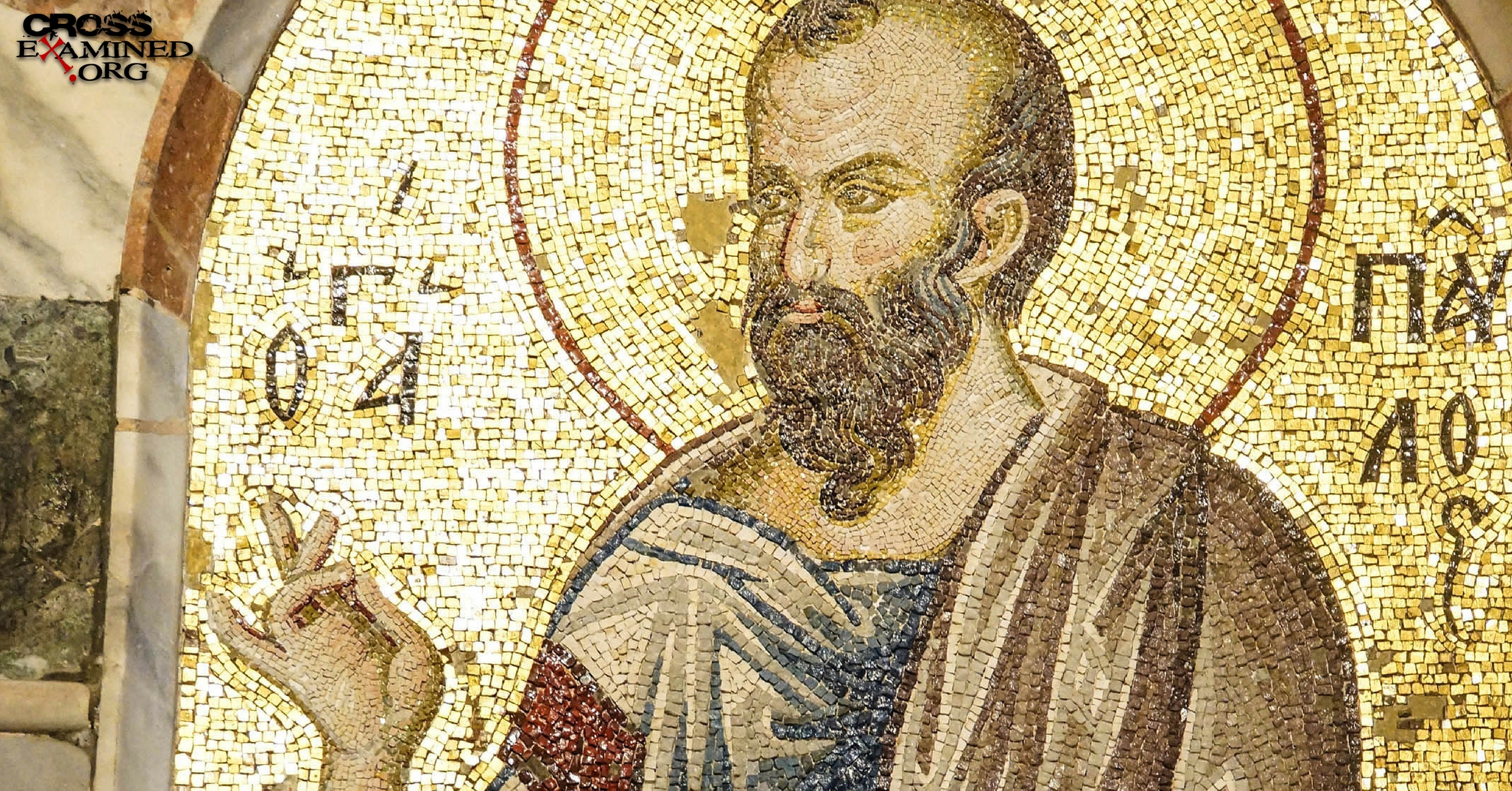By Brian Chilton
Skeptics, such as Gerd Ludemann, charged Paul for being the actual founder of Christianity. Such ideas come from either a belief that Jesus never addressed difficult topics, or a belief that Paul was too radical in his teachings for it to have come from Jesus. Both views are inherently wrong. A closer examination of the New Testament reveals that Jesus and Paul are found to be in close alignment in their theological moorings. Evidence suggests that Paul often quoted Jesus in his epistles. Craig Blomberg, in his book The Historical Reliability of the New Testament, reveals six areas where Jesus and Paul’s theology are closely aligned. So was Paul the founder of Christianity? Let’s examine the evidence.
Jesus and Paul express the same views on justification. The kingdom of God is central to the Synoptic Gospels appearing more than 100 times.[1] In contrast, the term only appears a mere 14 times in the letters of Paul. The central theme of Paul’s letters is on justification by faith. However, noting the misunderstanding that the Greco-Roman world would have with the kingdom of God and the close-alignment that Paul’s justification by faith has with the teachings of Jesus, then one begins to see a marvelous parallel. Jesus says four times that a person’s faith has saved, or healed them. For instance, at a dinner one evening, Jesus was approached by a woman who anointed him with expensive oil from an alabaster jar. The Pharisees were critical of Jesus’s allowance of this sinful woman to touch him. After angering the Pharisees by telling the woman that her sins were forgiven, Jesus said to the woman, “Your faith has saved you. Go in peace” (Luke 7:50).[2] The Jesus tradition predates the writing of Paul’s epistles, therefore, one can postulate that Paul learned his theology on justification from Jesus.
Jesus and Paul express the same views on the law. For full treatment on this issue, I would direct the reader to Blomberg’s work. Nevertheless, one should note that neither Jesus nor Paul called for the overthrow of the law (e.g., Jesus’s Sermon on the Mount in Matthew 5:17-20). Thus, neither advocated antinomianism.[3] Jesus noted that the greatest commandments were to love God with all one’s being and to love one’s neighbor as oneself (Matt. 22:36-40). Paul reiterated the second in Galatians 5:14.[4]
Jesus and Paul express the same views on concern for Gentiles. Paul emphasized the church’s ministry to Gentiles. It was Paul who wanted the church to rid its requirement of Gentile converts to perform circumcision. In Galatians 1-4, Paul charges the Judaizers with not promoting a true gospel. While Jesus’s ministry was largely to Jews, it must be remembered that his emphasis was due to his location and not his final focus. Like Paul, Jesus envisioned his church expanding past Israel. Jesus commended the Roman centurion for his amazing faith (Matt. 8:10-12) and took time to heal a Syrophoenician woman’s daughter, even with a tongue-in-cheek life lesson. Jesus’s feeding of the 4,000 was among a largely Gentile crowd. Also, Jesus’s Great Commission to the church commanded the church to take the message to all nations (Matt. 28:19). Thus, Paul is not inventing a new concept for the church to be pro-Gentile, but rather expounds upon the idea set forth by Jesus himself.
Jesus and Paul express the same views about women. Paul gives an extraordinary view of women in his letter to the Galatians. Paul writes, “There is no Jew or Greek, slave or free, male and female; since you are all one in Christ Jesus” (Gal. 3:28). Paul also allowed women to pray and prophesy in public (1 Cor. 11:2-16).[5] Jesus shared the same elevated status for women. Jesus commended Mary for receiving theological training as the men (Lk. 10:38-42). Blomberg notes that “Jesus affirmed the woman at the well to such a degree that she became an evangelist o her own people (John 4:4-42).”[6] Therefore, Paul did not invent a new doctrine in his acceptance of women. He continued what he had learned from Jesus and the early Jesus traditions.
Jesus and Paul express the same views on Christology. Some skeptics believe that Paul elevated the status of Jesus to a new level—the level of the divine. Shows such as PBS’s special From Jesus to Christ hold that Paul elevated the status of Jesus to a new level and one that Jesus himself did not accept. Is this true? Not at all! Again, Paul learned his Christology from Jesus and the early church. Two of the loftiest claims of Jesus’s divinity in Paul’s letters are found in Philippians 2:6-11 and Colossians 1:15-20. However, further investigation shows that the two passages are not original to Paul. They are in fact pre-New Testament hymns that most likely date to within 3-5 years of Jesus’s crucifixion and resurrection. Thus, Paul is relaying information that is original to the early church. Even still, one must note the examples of divine status that Jesus gave himself. The “I am” statements in John’s Gospel relate to the divine name of God (Yahweh means “I am what I am”). Jesus’s favorite title for himself is “Son of Man.” The Son of Man title holds a direct correlation to Daniel’s Son of Man who approaches the Ancient of Day. Thus, the name Son of Man relates Jesus to the divine. Paul is not inventing Jesus’s divine nature. Rather, he is continuing the teaching found in the earliest church—that which was found from Jesus himself.
Jesus and Paul express the same views on discipleship. Jesus often noted that discipleship was costly. Jesus taught that discipleship required one to die to oneself in order to find salvation in Christ (Matt. 10:39 and Lk. 17:33). Jesus taught that if one were to follow him, that person must take up their cross and follow him (Matt. 16:24). Paul, in like manner, teaches that the disciple is baptized into Christ’s death (Rom. 6:3-6), that sharing the cup of blessing was also to share the blood of Christ (1 Cor. 10:16-21), and that we die to the self as we live in Christ (Eph. 1-2). Again, Paul is not formulating a new doctrine, but promoting one that originated with Christ.
Conclusion
Was Paul the founder of Christianity? In a short answer, no. Paul was heavily influential with the development of the church. However, Paul did not create a movement. Neither did Paul change the church. Rather, Paul drew from the ideas of Jesus who was the true founder of Christianity. Craig Blomberg, the man who inspired this article, wrote quite succinctly, “Paul may have been the ‘second founder’ of Christianity but only by building on and in submission to the true founder—Jesus of Nazareth.”[7] A closer examination of the New Testament reveals that Paul certainly built upon the ideas of Jesus, but he did not invent them. Paul was a disciple of the true founder of Christianity—Jesus of Nazareth.
Notes
[1] Craig Blomberg, The Historical Reliability of the New Testament: Countering the Challenges to Evangelical Christian Beliefs (Nashville: B&H Academic, 2016), 440.
[2] Unless otherwise noted, all quoted Scripture comes from the Christian Standard Bible (Nashville: Holman, 2017).
[3] That is, the abolition of the law and moral principles.
[4] “For the whole law is fulfilled in one statement: Love your neighbor as yourself” (Galatians 5:14, CSB).
[5] The issue of head coverings was probably a cultural one. Thus, we do not have the space to cover the topic here.
[6] Blomberg, 449.
[7] Blomberg, 460.
Original Blog Source: http://bit.ly/2qJSICI














